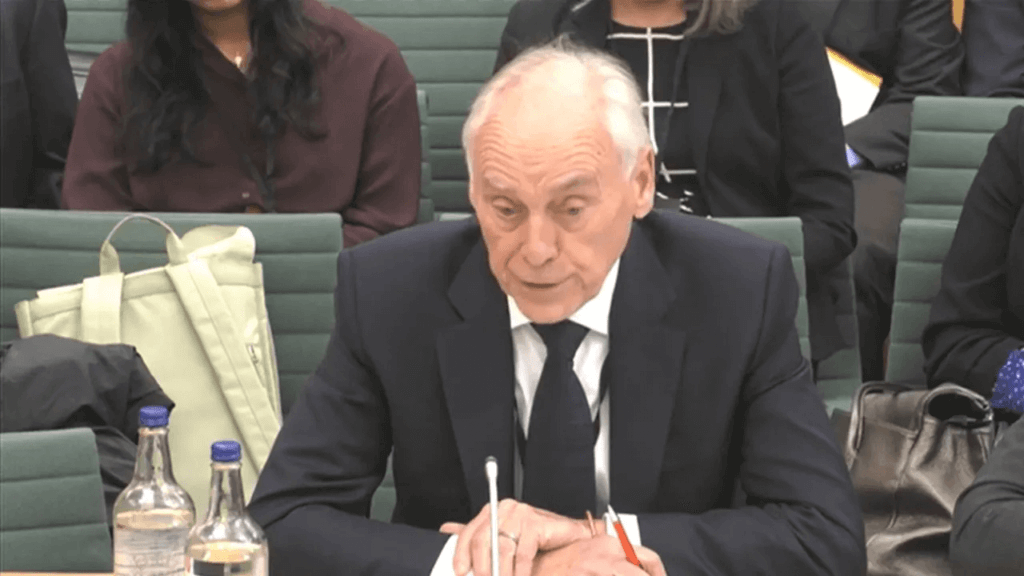
Colin Graves has yet to apologize directly to Azeem Rafiq for the bigotry he experienced while playing for Yorkshire.
Graves returned as Yorkshire chair this month after serving from 2012 to 2015, during which time the club was fined £400,000 for failing to address the pervasive use of racist or discriminatory language. Rafiq revealed his encounters with racism while playing there.
Graves, who declined to testify at the parliamentary hearings that followed Rafiq’s charges in November 2021, came before the Department of Culture, Media, and Sport select committee on Tuesday. Graves accepted the opportunity to record an apology to Rafiq, but when questioned if he had called Rafiq to apologise directly, he said no.
“I haven’t apologised to him personally, no,” Graves told the committee. “If I had the opportunity to talk to him then fine, I would do because he should not have experienced what he experienced.”
However, John Nicolson MP grilled Graves more, questioning why he had not contacted Rafiq.
“Certainly, from my point of view, I didn’t feel that was appropriate at the time,” Graves said. “I’ve apologised today to Mr Rafiq and anybody else who experienced any discrimination or racism. I just had plenty things going on around not to pick up the phone to Mr Rafiq.”
Graves responded to Nicolson’s question about having “plenty of things going on” that stopped him from calling: “Fine, if that’s how you see it, I don’t see it like that.”
Graves delivered a “personal and unreserved” apology to all victims of racism at Yorkshire County Cricket Club last month, following confirmation that his return to the board would be approved at an extraordinary general meeting (EGM) at Headingley on February 2.
“I’ll apologise again today,” Graves told the select committee. “Because anybody from a minority ethnic background who experienced either discrimination or racism at Yorkshire, that should never have happened. It never will be acceptable and it certainly won’t be going forward. I apologise for anybody who went through any discrimination or racism, it is not accepted.”
Graves reportedly apologized for dismissing the charges as “banter” during an interview last year.
“I did an interview in June, July 23 where I used the word ‘banter’. At the time I didn’t realise the insensitivity of that word,” he said. “And again, since then I’ve apologised for using that word and I apologise again. I should not have used it. It was a bad judgement from my point of view.”
Graves reiterated his assertion that he was never made aware of any issues of racism during his previous tenure as Yorkshire chair.
“Basically the way I ran the club previously, maybe the processes weren’t thorough enough to record those kind of things, if it happened and when it’s happened, so from my point of view, I never heard anything about racism through any management meeting, any board meeting, it was never brought to my attention,” he said.
When Graves’ comeback was announced in January, Rafiq penned a newspaper essay pushing sponsors to boycott the club. Graves stated that no sponsors had gone in the 11 days since he took up the post, and six more had shown an interest in holding negotiations.
Graves stated that his first goal was to restore Yorkshire’s financial stability, following which he planned to leave for a maximum of two to three years.
Yorkshire were expected to get an immediate injection of £1 million as part of his return to the club, followed by an additional £4 million in investment. Graves’ first interaction with the club occurred in comparable financial conditions in 2002, when, as the founder of the Costcutter supermarket chain, his bailout saved the company from bankruptcy. His family trust, which is controlled by independent trustees, still owes the club approximately £15 million.
Meanwhile, Cindy Butts, chairwoman of the Independent Commission for Equity in Cricket (ICEC), which released a report last year exposing racism, sexism, and class-based discrimination in cricket, testified before the committee, accusing former England allrounder Ian Botham of “untruths” about the report.
She informed MPs that Botham had been requested to give evidence before the commission, despite his claims that he had not been asked to do so.
Botham called the ICEC findings “nonsense” and the ECB’s decision to commission the research a “complete and utter waste of money”.
Butts was also disappointed that the ECB “didn’t call out Lord Botham,” claiming they “should have had a moral backbone on this issue.”
“Firstly, we did invite Lord Botham to give evidence to us,” Butts said. “He didn’t respond. The county which he chairs, Durham, contributed to our call for written evidence and we thank them for that.
“He [Botham] said he didn’t know anybody who had contributed to our report when, in fact, a number of well-known named cricketers such as Heather Knight, the England women’s captain, responded and gave evidence to us. So there are a number of untruths that he spoke about the report.
“But the most disappointing thing for me, I feel, is that Lord Botham is a chair of a first-class county. What confidence to those within the county who may suffer racism, sexism, class-based discrimination . . . what confidence can they have if they are subject to discrimination to come forward and be able to talk about their experiences and have confidence that something could be done about it?”
Richard Thompson, the ECB’s chair, later told the committee that he called Botham after he made the statements “to question why” and “made it very clear to him I didn’t agree” with his views.
On the same day Thompson, Richard Gould, the ECB’s chief executive, and his deputy, Clare Connor, appeared before the select committee, the ECB released a progress report on its plan to make cricket more inclusive in the aftermath of the ICEC report, stating that 11 of its 12 projects were on track.
The ECB said earlier this month that Connor, the former England women’s captain who had served as interim CEO prior to Gould’s appointment, will resign from her position at the end of the hearing for personal reasons.
For the latest updates and comprehensive coverage on this developing story, visit CricAdvisor – your ultimate cricket companion.










